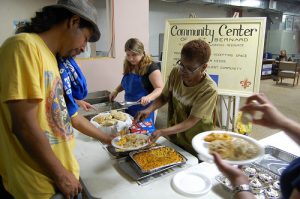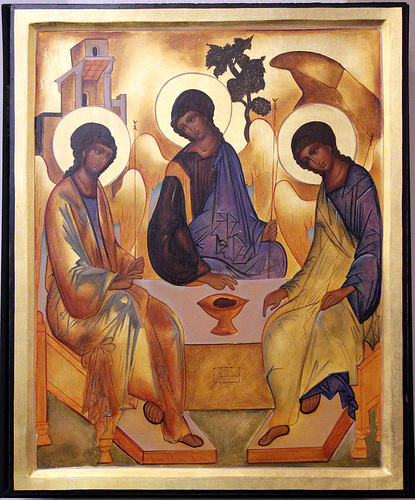Lectionary Reflection
Holy Trinity Sunday, June 19, 2011
Go therefore and make disciples of all nations, baptizing them in the name of the Father and of the Son and of the Holy Spirit, and teaching them to obey everything that I have commanded you. And remember, I am with you always, to the end of the age.” Matthew 28:19-20
On Holy Trinity Sunday the church celebrates the triune nature of God–Father, Son, and Holy Spirit. It’s a tough concept to wrap one’s mind around. After all, God is beyond us in so many ways but near to us in other ways. Think of the illustrations people have used through the ages to try and explain this idea–from St. Patrick’s shamrock to water, vapor, and ice–each dancing around the edges of God’s nature but in no way bespeaking its fullness. I am pretty sure a lot of parishioners leave worship no more sure about the Trinity than when they arrived.
The readings for this Sunday are not particularly useful for dissecting and analyzing the Trinity either. The Old Testament reading celebrates creation. Sure there is the Divine proclamation “Let us make humankind in our image, according to our likeness…” (Genesis 1:26), the identity of us is not explicitly stated.
Some worship leaders and preachers may try to stretch the final verse of the epistle (2 Corinthians 13:13) into a Trinitarian statement, but contextually that seems a far and tricky reach. Sure, it mentions all three persons of the Trinity in combination with an attribute/action, but does it really explain God in three persons, one in three and three in one?
Then, if you’re still scratching your head and wondering where to go this week, the gospel on first reading doesn’t seem to offer anything logical. The “Great Commission” for Trinity Sunday? Really? Worship, doubt, and divine authority? What does say about the Trinity?
Actually, I think the gospel does have something important to say to us about God’s nature and the Holy Trinity. The problem comes in our conditioning over time to understand this as a strictly missional passage–something we are supposed to GO and DO rather than BE and DO. Take a look at the gospel passage again. There’s a lot more going on besides what we hear in the last two verses.
 It sounds to me like a lot of things are still the same after all these years. Disciples still follow Jesus to “the mountain” in the form of gathering with our sisters and brothers as worshiping communities. We worship, and yes, sometimes we experience doubt. Jesus still holds all authority, and in and by that authority, we are empowered to BE the beloved community as outlined in the final two verses. Now, that sense of community, of relationship, of mutual activity and shared experience, that to me, dear friends is where we see the Triune nature of God best expressed in this week’s readings.
It sounds to me like a lot of things are still the same after all these years. Disciples still follow Jesus to “the mountain” in the form of gathering with our sisters and brothers as worshiping communities. We worship, and yes, sometimes we experience doubt. Jesus still holds all authority, and in and by that authority, we are empowered to BE the beloved community as outlined in the final two verses. Now, that sense of community, of relationship, of mutual activity and shared experience, that to me, dear friends is where we see the Triune nature of God best expressed in this week’s readings.
We see the work of God best in community, in relationship. I am often reminded of Rublev’s Icon, of the relationship and mutuality shown in the three persons seated around the table, in the three persons of the Trinity, of our God. We are not alone, and as humans we are not meant to be alone or to operate in isolation.
This Sunday, why not remind each other of the power of community, be it community as expressed in the three persons of the Trinity or community in our respective contexts? Consider how community works in your context. Are you increasingly relying on social media to communicate? Do you find your congregation fragmented and difficult to gather? Do you offer ways for disciples to gather in community in meaningful face-to-face ways?
If you want to read a good reflection about the nature of online communities and the importance of actually being somewhere and experiencing life in community, check out Jason Byassee’s post, “The Logic of Online Community” at sojourners.net. However you decide to address the Trinity this week, do consider lifting up community, our life together, in all its fragility and wonder. Blessings on your preaching and teaching.
(Photo by jdbradley and ccstbp used under Creative Commons License. Thanks!)




Leave a Reply